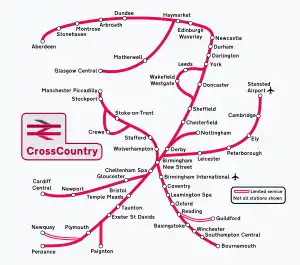CrossCountry
CrossCountry (legal name XC Trains Limited[1]) is a train operating company in the United Kingdom owned by Arriva UK Trains, operating the Cross Country franchise.
 A Class 220 Voyager on the South Devon Railway sea wall in July 2009 | |||
| Overview | |||
|---|---|---|---|
| Franchise(s) |
| ||
| Main route(s) | West Midlands, East Midlands, South West, Yorkshire and the Humber, and North East | ||
| Other route(s) | South East Wales, North West, East of England, South East, and Scottish Lowlands | ||
| Fleet size |
| ||
| Stations called at | 120 | ||
| Parent company | Arriva UK Trains | ||
| Reporting mark | XC | ||
| Predecessor |
| ||
| Technical | |||
| Length | 2,397.9 | ||
| Other | |||
| Website | www | ||
| |||
The CrossCountry franchise was restructured by the Department for Transport (DfT) in 2006, incorporating elements of both the Central Trains and the Virgin CrossCountry franchises, ahead of its invitation to tender on October of that year. On 10 July 2007, the DfT announced that Arriva had been awarded the New Cross Country franchise. CrossCountry is one of only two franchised train operating companies that does not manage any stations, the other being Caledonian Sleeper. CrossCountry's services have been periodically disrupted by industrial action amongst its staff, often due to disputes over rostering and pay. While the franchise had been originally due to conclude on 31 March 2016, multiple subsequent agreements have been enacted; in October 2020, the DfT confirmed that the franchise has been extended for a further three years for a finish date of October 2023.
At the commencement of operations, CrossCountry's rolling stock consisted of 34 four-car Class 220 Voyagers and 40 five-car and 4 four-car Class 221 Super Voyagers from Virgin CrossCountry as well as 11 two-car and 18 three-car Class 170 Turbostars from Central Trains. As per its franchise agreement, it obtained ten Class 43 power cars and forty Mark 3 carriages to operate on services that required greater seating capacity, while some Super Voyagers were transferred to Virgin West Coast. Overhauls of the Voyager & Super Voyager fleets were performed, the removal of the shop to fit more seating and storage being a prominent change; the Mark 3 carriages were also refurbished to provide suitable amenities for modern travellers. Both the Super Voyagers and Turbostars fleets have been extended where possible to provide more capacity.
The company's network is centred around Birmingham New Street. It operates intercity and other long-distance passenger trains across Great Britain, but does not serve Greater London. It operates the UK's longest direct rail passenger service, from Aberdeen in the north-east of Scotland to Penzance in western Cornwall, which has a journey time of more than 13 hours. While some services on the West Coast Main Line were promptly discontinued with the introduction of a new timetable on 9 December 2007, with some transferring over to both Virgin Trains West Coast and to First TransPennine Express, new services, such as a daily Nottingham to Bournemouth service introduced during December 2008, were also implemented. CrossCountry has designated four stations as alternative changeover stations: Cheltenham Spa, Derby, Leamington Spa and Wolverhampton. Special services have been occasionally, run, such as between Bournemouth and Weymouth in support of the Sailing at the 2012 Olympics & Paralympics.
History
Formation
During June 2006, the Department for Transport (DfT) announced its intention to restructure a number of the existing railway franchises.[2] As a result of these changes, a 'New Cross Country' franchise was produced, which incorporated the existing InterCity Cross Country franchise run by Virgin CrossCountry, while excluding those services ran on the West Coast Main Line (while the Birmingham to Scotland services were transferred to Virgin Trains West Coast and the Manchester to Scotland services transferring to First TransPennine Express). Several services from the Central Trains franchise were also to be added.
In October 2006, the DfT issued the invitation to tender to the four shortlisted bidders: Arriva, FirstGroup, National Express and Virgin Rail Group.[3] On 10 July 2007, the DfT announced that Arriva had been awarded the New Cross Country franchise, and that the services operated by Virgin CrossCountry would be transferred to CrossCountry on 11 November 2007, along with the Cardiff to Nottingham and Birmingham to Stansted Airport services from Central Trains.[4][5]
Transfer and withdrawal of services
After taking over the franchise, CrossCountry continued to operate the existing timetable including the West Coast Main Line services for four weeks. When the new timetable commenced on 9 December 2007 on 11 November 2007, the Birmingham New Street to Edinburgh Waverley and Glasgow Central services were transferred to Virgin Trains West Coast while the Manchester Airport to Edinburgh and Glasgow services transferred to First TransPennine Express.[6]
The tender did not require retention of the services beyond Guildford after December 2008, so the services to both Gatwick Airport and Brighton soon ceased.[7] As a result of these changes, all CrossCountry services now completely avoid Greater London. During July 2020, a daily service between Reading and Guildford that had been continued until withdrawn.
Changes to services
Starting in December 2008, a daily Nottingham to Bournemouth service was introduced. From December 2010, a number of services from Newcastle were extended from Reading to Southampton.[8] From May 2011, a number of services were extended from Edinburgh to Glasgow to replace East Coast services.[9]
By mid-2020, CrossCountry had considerably curtailed its services in response to the significant decline of passenger travel amid the COVID-19 pandemic.[10][11] From 15 June 2020, both passengers and staff on public transport in England, including CrossCountry services, were required to wear face coverings while travelling, and that anyone failing to do so would be liable to be refused travel or fined.[12][13]
Extension of the franchise
While the franchise had been originally due to conclude on 31 March 2016, during August 2013, it was announced that it had been extended until December 2019.[14] At one point, it had been expected that an Invitation to Tender would be issued in October 2018 for the next franchise,[15] however, during September 2018, it was announced that the competition had been cancelled so that the recommendations from a report into the franchise system could be incorporated.[16] In July 2019, the Direct Award was further extended by one year, moving the expiry date back to October 2020.[17] During September 2020, it was announced that the emergency agreements with train operating companies introduced due to the COVID-19 pandemic in the United Kingdom were to be extended for 18 months, and that all passenger rail franchising in Great Britain was abandoned.[18] In October 2020, the DfT confirmed that the franchise has been extended for a further three years, putting the finishing date back to October 2023.[19]
Industrial action
During November and December 2017, CrossCountry on-board train managers and senior conductors affiliated with the National Union of Rail, Maritime and Transport Workers (RMT) staged five 24-hour and two 48-hour strikes in an industrial dispute regarding staff rostering, in particular in relation to working on Sundays.[20][21][22][23] While further strikes had been planned for January 2018, however, these were cancelled after CrossCountry and the RMT came to an agreement over staff working conditions on 11 January.[24]
Separate strike action was later threatened by the Transport Salaried Staffs' Association (TSSA) union later that month, with strikes planned for 26 January. These were in relation to CrossCountry staff being offered a 1% pay rise, compared to a 3.3% pay rise for staff at other Arriva-owned train operating companies. As a result of an agreement with CrossCountry to match their demands for an equal pay rise, the planned industrial action by the TSSA was cancelled.[25]
CrossCountry was one of several train operators impacted by the 2022 United Kingdom railway strike, which was the first national rail strike in the UK for three decades.[26] Its workers were amongst those who voted in favour of industrial action due to a dispute over pay and working conditions.[27] CrossCountry was only capable of operating a very minimalist timetable on any of the planned dates for the strikes due to the number of staff involved.[28][29]
Services
The company operates medium- and long-distance services that run outside of the London area. The network is centred at Birmingham New Street station. Services can be categorised into two types:
- Inter-City: long-distance, fast services between the South of England and the North of England or Scotland via Birmingham, these routes are typically operated by Voyagers or HST sets.[30]
- Regional: medium-distance, stopping or semi-fast services between Birmingham and other cities in the Midlands, as well as some longer runs to Wales and West Anglia. These are usually operated by Turbostars.[30]
CrossCountry's official website does show a distinction between the two types of services (for example, each has a separate timetable booklet), but does not explicitly call them Inter-City and Regional.[31]
Core
As of May 2022, the Monday-Friday daytime services, with frequencies in trains per hour (tph), include:[32][33]
| Scotland and Manchester to South West | |||
|---|---|---|---|
| Route | tph | Calling at | |
| Plymouth – Edinburgh Waverley | 1tp2h |
| |
| Plymouth – Glasgow Central | 1tp2h |
| |
| Reading – Newcastle | 1tp2h |
| |
| Southampton Central – Newcastle | 1tp2h |
| |
| Reading - Manchester Piccadilly | 1tp2h |
| |
| Bournemouth – Manchester Piccadilly | 1tp2h |
| |
| Bristol Temple Meads – Manchester Piccadilly | 1tp2h |
| |
| Exeter St Davids – Manchester Piccadilly | 1tp2h |
| |
| Stansted and Nottingham to Cardiff | |||
| Route | tph | Calling at | |
| Cardiff Central – Nottingham | 1 |
| |
| Birmingham New Street – Nottingham | 1tp2h |
| |
| Birmingham New Street – Cambridge | 1 |
| |
| Birmingham New Street – Leicester | 1 |
| |
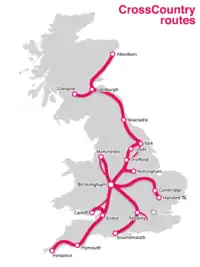
These services combine to provide higher frequencies between Birmingham and the following major destinations:
- Wolverhampton, Stoke-on-Trent, Macclesfield, Stockport and Manchester: two trains per hour
- Derby: three trains per hour
- Sheffield, York, Darlington and Newcastle: one train per hour via Leeds
- Nottingham: two trains per hour
- Leicester: two trains per hour
- Leamington Spa, Oxford and Reading: two trains per hour (including one via Coventry)
- Cheltenham: three trains per hour
- Bristol: two trains per hour
The Sunday service pattern is mostly similar to the weekday one, except that the hourly Birmingham - Nottingham services do not run while the other services do not start until late morning or early afternoon, and often have a slightly different stopping pattern.[32][33]
Due to emergency travel restrictions introduced in 2020 by the Government in response to the COVID-19 pandemic, a reduced timetable was introduced in June 2020 and which remains in place until further notice.
Extensions
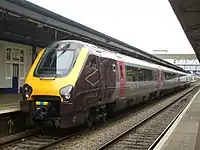
The above table shows the basic service pattern; however, a small number of these services are extended beyond their usual destination:[32]
- from Plymouth to Penzance
- from Bristol Temple Meads to Cardiff Central, Exeter St Davids, Paignton, Plymouth and Penzance
- from Edinburgh Waverley to Dundee and Aberdeen
- from Newcastle to Edinburgh Waverley and Glasgow Central
- travelling via Crewe either in lieu of, or in addition to Stoke-on-Trent
Special services
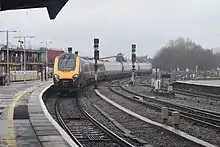
CrossCountry extended some of its Bournemouth services to Weymouth for the Sailing at the 2012 Olympics & Paralympics. There were two services Monday to Saturday in each direction with one in each direction on Sundays. These ran express to Weymouth from Bournemouth. One train also operated a Weymouth to Bournemouth return journey, calling at Wareham and Poole.[34]
Proposed services
During December 2016, CrossCountry published a consultation document for changes to the timetable proposed to be implemented in December 2017. These included:[35]
- Extending all hourly Bristol–Manchester services to and from Exeter St Davids, providing a total of two trains per hour between Exeter and Birmingham;
- Increasing the frequency of services during peak times on several routes;
- An additional service to and from Aberdeen running in the early afternoon.
To allow these changes to take place, all CrossCountry services on some routes (which had a limited service) would be withdrawn and replaced with extra services run by other operators. These included:
- between Exeter St Davids and Paignton (except for one early-morning northbound service), replaced by Great Western Railway services;
- between Reading and Guildford, replaced by Great Western Railway services;
- between Edinburgh Waverley and Aberdeen in the morning and evening (Aberdeen would be served during the day instead), replaced by ScotRail services.[lower-alpha 1]
In April 2017, it was announced the proposed changes would not be proceeding.[36]
Stations served only by CrossCountry
CrossCountry does not manage any stations, although there are stations managed by other train operating companies at which it is the only operator: five stations (Burton-on-Trent, Hinckley, Narborough, South Wigston and Willington) are managed by East Midlands Railway, while three stations (Coleshill Parkway, Water Orton and Wilnecote) are managed by West Midlands Trains. At Tamworth station, which has tracks and platforms at two levels, the high-level platforms are served only by CrossCountry, but the entire station is managed by West Midlands Trains, which serves the low-level platforms. Similarly, at Worcestershire Parkway, the low-level platforms are served only by CrossCountry, but the station is managed by Great Western Railway, which serves only the high-level platforms.
Manea was served only by CrossCountry until 2013, when Abellio Greater Anglia started running one train every two hours at the station in addition to the CrossCountry services there.
Other route information
To improve the travelling experience, CrossCountry has designated four stations as alternative changeover stations: these are Cheltenham Spa, Derby, Leamington Spa and Wolverhampton. Connection times can be shorter at these smaller stations. For example, passengers travelling from Cardiff to Edinburgh could change at Cheltenham – where both their trains use the same platform – instead of Birmingham New Street, a larger, more complex station. These four stations are marked on the CrossCountry route map in yellow.
Rolling stock
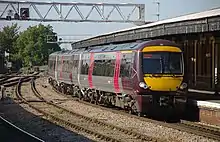

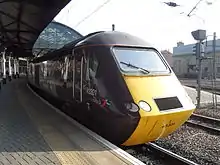
CrossCountry services are operated using diesel trains only, since none of the routes it operates are fully electrified.
CrossCountry inherited 34 four-car Class 220 Voyagers and 40 five-car and 4 four-car Class 221 Super Voyagers from Virgin CrossCountry as well as 11 two-car and 18 three-car Class 170 Turbostars from Central Trains.[37]
In December 2007 Class 221 Super Voyagers 221101 - 113 and 221142 - 144 were transferred to Virgin Trains West Coast with 221114 - 118 following in December 2008.[38]
A franchise commitment was the acquisition of ten Class 43 power cars and forty Mark 3 carriages. Midland Mainline had six Class 43 power cars and fourteen Mark 3 carriages that were off lease from November 2007 that were leased. The remaining four Class 43 power cars were ex Virgin CrossCountry examples in varying states of decay,[39] while the carriages were five ex-Virgin CrossCountry Mark 3 carriages and twenty-one ex-Virgin Trains West Coast loco-hauled Mark 3B carriages. Most had been in store at Long Marston for a few years.[40]
After driver training the ex-Midland Mainline sets returned to service in May 2008 on Glasgow and Edinburgh to Plymouth diagrams while the other Class 43 power cars were overhauled at Brush Traction including repowering with MTU engines[41][42] and the Mark 3 carriages overhauled at Doncaster Works to a similar specification as GNER's Mallard refurbishments.[43][44] Once these were completed, the ex-Midland Mainline examples were also overhauled.[45]
To operate services to Paignton and Newquay on summer Saturdays, two High Speed Trains were hired from National Express East Coast in 2008.[46] High Speed Trains were hired from East Coast and East Midlands Trains on a number of occasions to operate services from Edinburgh Waverley to Plymouth when HSTs or Voyagers were unavailable.
During 2008, the Class 170 Turbostar fleet was refurbished, during which the three-carriage units repainted at Marcroft Engineering, Stoke on Trent, the two-carriage units at EWS's Toton depot and the interiors renewed by Transys Projects, Clacton-on-Sea, including the fitting of first-class seating to the Class 170/5s and 170/6s.[47][48]
The tilt function on the Class 221 Super Voyagers was removed in 2008; tilting was not required on the parts of West Coast Main Line that CrossCountry serves.[49][50] CrossCountry stated this change would improve reliability and reduce maintenance costs.
Between 2008 and 2009, both the Class 220 Voyagers and Class 221 Super Voyagers underwent refurbishment at Bombardier Transportation's Derby Litchurch Lane Works. This work involved the removal of the shop, adding 25% extra luggage space and fourteen extra standard-class seats to the Class 220 Voyagers and 20% extra luggage space and sixteen extra standard-class seats to the Class 221 Super Voyagers.[51] Three years later, a refresh of the interiors was conducted, during which the standard-class seats were re-covered in the existing red and blue moquette and while the first class seats were finished with a maroon moquette. In summer 2014, CrossCountry began removing the quiet coach designation from such vehicles across its Voyager fleet, believing them to be outdated and to take up an excessive amount of space on a four-car unit; however, it did retain the quiet coaches on its five HST sets.[52]
During November 2017, as a part of CrossCountry's franchise extension, two former Virgin Trains Class 221 Super Voyager driving cars of unit 221144 were reactivated, having been stored at Central Rivers TMD for several years. Two of the existing five-car sets releasing a centre carriage that, when combined with the reactivated pair of driving cars, formed an additional four-car set to be formed.[53]
In 2021, six of the existing two-carriage Class 170s were lengthened. This happened as a result of East Midlands Railway only leasing the two-carriage driving vehicles of the West Midlands Railway 170/6 sets, hence six centre cars became available when they were replaced by West Midlands Trains for transfer to CrossCountry.[54][55][56][57]
Current rolling stock
| Family | Class | Image | Type | Top speed | Coaches | Number | Built | |
|---|---|---|---|---|---|---|---|---|
| mph | km/h | |||||||
| InterCity 125 | 43 |  |
Diesel locomotive | 125 | 200 | 2 + 7 | 12 | 1976–1982 |
| Mark 3 |  |
Passenger carriage | 40 | 1975–1988 | ||||
| Bombardier Turbostar | 170 |  |
DMU | 100 | 160 | 2 | 7 | 1998–2002 |
| 3 | 22 | |||||||
| Bombardier Voyager | 220 Voyager | .jpg.webp) |
DEMU | 125 | 200 | 4 | 34 | 2000–2001 |
| 221 Super Voyager | .jpg.webp) |
125 | 200 | 4 | 4 | 2001–2002 | ||
| 5 | 20 | |||||||
Future rolling stock
It has been proposed that, around 2023, CrossCountry should operate all of the Class 222s cascaded from East Midlands Railway to provide extra capacity.[54]
Notes
- The proposed withdrawal does not include the morning/evening services that run only between Edinburgh and Dundee.
References
- "XC Trains Limited". Companies House. Retrieved 29 December 2017.
- "New Cross Country Franchise Consultation Document" (PDF). dft.gov.uk. Department for Transport. June 2006. Archived from the original (PDF) on 2 September 2009. Retrieved 17 September 2012.
- "New Cross Country Franchise Invitation to Tender" (PDF). dft.gov.uk. Department for Transport. October 2006. Archived from the original (PDF) on 9 April 2010.
- "New rail franchise to increase capacity between major cities". Department for Transport. 10 July 2007. Archived from the original on 12 August 2007.
- "Arriva welcomes new CrossCountry rail franchise award". Arriva. 10 July 2007. Archived from the original on 20 May 2012. Retrieved 16 September 2012.
- "Bristol and Manchester linked every two hours in CrossCountry's December timetable" (PDF) (Press release). CrossCountry. 12 December 2007.
- "Frequently Asked Questions: How will the timetable change and when?". CrossCountry. Archived from the original on 22 August 2008.
- "New Southampton train services" (Press release). CrossCountry. 19 November 2010.
- "East Coast Welcomes Future New Timetable" (Press release). East Coast. 20 January 2010. Archived from the original on 9 April 2013.
- "Coronavirus: Rail franchise agreements suspended to avoid company collapses". Sky News. 23 March 2020. Archived from the original on 27 May 2020. Retrieved 23 March 2020.
- Osborne, Samuel (27 December 2021). "COVID-19: Christmas travel disruption as Omicron hits rail and airline staffing". news.sky.com.
- "Transport Secretary's statement on coronavirus (COVID-19): 4 June 2020". GOV.UK. Archived from the original on 23 June 2020. Retrieved 21 June 2020.
- Paton, Graeme. "Coronavirus: facemask plans mired in confusion". The Times. Archived from the original on 21 June 2020. Retrieved 21 June 2020.
- "Railway plan puts new focus on passengers". Secretary of State for Transport. 26 March 2013. Archived from the original on 13 August 2013. Retrieved 27 March 2013.
- "Franchise Letting Process Agreement Between The Secretary Of State For Transport And The Applicants (As Defined)" (PDF). Gov.UK. Archived (PDF) from the original on 25 July 2019. Retrieved 25 June 2021.
- "Cross Country rail franchise 2018: prospectus". Department for Transport. 20 September 2018. Retrieved 20 September 2018.
- "Auditors raise rail red flag over fallout from Arriva's £3bn sale". The Telegraph. 2 July 2019.
- "Rail franchises axed as help for train firms extended". BBC News. 21 September 2020. Retrieved 21 September 2020.
- "CrossCountry handed new three-year deal to run train services". Alloa and Hillfoots Advertiser. Retrieved 16 October 2020.
- "Strike action goes ahead on Arriva Cross Country". National Union of Rail, Maritime and Transport Workers. Retrieved 21 October 2018.
- Penfold, Simon. "Fresh festive rail chaos as CrossCountry strikes start tomorrow". www.expressandstar.com. Retrieved 21 October 2018.
- Probert, Sarah (25 November 2017). "Cross Country Trains to be hit by RMT strike on Sunday". Retrieved 21 October 2018.
- Weatherby, Bronwen (25 November 2017). "How your journey could be affected by Sunday's rail strike". Retrieved 21 October 2018.
- "Arriva Cross Country industrial action suspended". National Union of Rail, Maritime and Transport Workers. Retrieved 21 October 2018.
- "Cross Country managers to receive a 3.3% pay rise". www.employeebenefits.co.uk. Retrieved 21 October 2018.
- "Rail strike: RMT union votes for national action". BBC News. 24 May 2022. Retrieved 24 May 2022.
- Burn, Chris (5 July 2022). "CrossCountry and East Midlands Railway staff vote for rail strike action". yorkshirepost.co.uk.
- "The dates of the train, Tube and bus strikes this week, and how services will be affected". inews.co.uk. 20 June 2022. Retrieved 24 June 2022.
- "Trains across the Midlands brought to standstill as rail workers strike over pay and conditions". itv.com. 21 June 2022.
- "Types of CrossCountry Train". Cross Country. Retrieved 22 July 2022.
- "Train Timetables". Cross Country. Retrieved 22 July 2022.
- "Scotland and North East to South and South West Timetable, May 2020" (PDF). CrossCountry Trains. Retrieved 14 June 2020.
- "Stansted, Cambridge and Nottingham to Birmingham and Cardiff timetable, May 2020" (PDF). CrossCountry Trains. Retrieved 14 June 2020.
- "London 2012 Olympic Games". CrossCountry. Archived from the original on 3 May 2012. Retrieved 26 June 2012.
- "CrossCountry Future Timetable Consultation" (PDF). CrossCountry. Retrieved 22 December 2016.
- "Plans to cut CrossCountry trains to Aberdeen to be scrapped". edinburghnews.scotsman.com. Retrieved 21 October 2018.
- "Class 170 History". Railway UK - UK Railway Information. Retrieved 22 July 2022.
- "Bio-fuel under review as Virgin confirms Voyager moves". Rail. No. 575. 26 September 2007. p. 16.
- "Ex Virgin HST Power Car List". ukwayfarer.byethost32.com. Retrieved 21 October 2018.
- "Brush wins XC Class 43 HST overhaul deal". Rail. No. 586. 27 February 2008. p. 62.
- "CrossCountry signs deal to overhaul High Speed Trains" (Press release). Arriva. 24 January 2008. Archived from the original on 20 May 2012. Retrieved 16 September 2012.
- {{cite publisher = https://web.archive.org/web/20070114100712/http://www.therailwaycentre.com/New%20TRC%20Main%20Pages/MTU%20Class%2043s.html |title = MTU fitted Class 43 HST powercars |publisher = TheRailwayCentre.com}}[Usurped!]
- "Deal signed to refurbish high speed train carriages" (Press release). CrossCountry. 22 April 2008.
- "Project Profile HST trailer cars" (PDF). Wabtec Rail. Archived from the original (PDF) on 31 August 2012. Retrieved 22 July 2022.
- "CrossCountry Unveils First Refurbished HST" (Press release). CrossCountry. 1 October 2008.
- "More CrossCountry seats for Holidaymakers" (Press release). CrossCountry. 27 March 2008.
- "Refurbishment of Class 170 Turbostar trains begins" (Press release). CrossCountry. 30 January 2008.
- "CrossCountry's first refurbished Turbostar enters service" (Press release). CrossCountry. 19 May 2008. Archived from the original on 26 December 2012. Retrieved 28 July 2022.
- Miles, Tony (August 2008). "CrossCountry stops tilting". Modern Railways. London. p. 71.
- "CrossCountry removes tilt from its 221 Voyagers". Rail. No. 595. 2 July 2008. p. 8.
- "Seats not shops for Voyagers". Rail. No. 589. 9 April 2008. p. 23.
- Rail. No. 755. 20 August 2014. pp. 60–61.
{{cite magazine}}: Missing or empty|title=(help) - "CrossCountry's extra Voyager in service". Modern Railways. No. 831. December 2017. p. 85.
- "Government and CrossCountry work on train capacity plan". railmagazine.com. Retrieved 25 June 2021.
- "East Midlands Railway plans Spring 2020 start for Class 170s". railmagazine.com. 28 November 2019. Retrieved 28 November 2019.
- "Progress on new train fleets continues". railmagazine.com. Retrieved 25 June 2021.
- "First WMT 170 joins EMR fleet". Rail. No. 925. 24 February 2021. p. 28.
